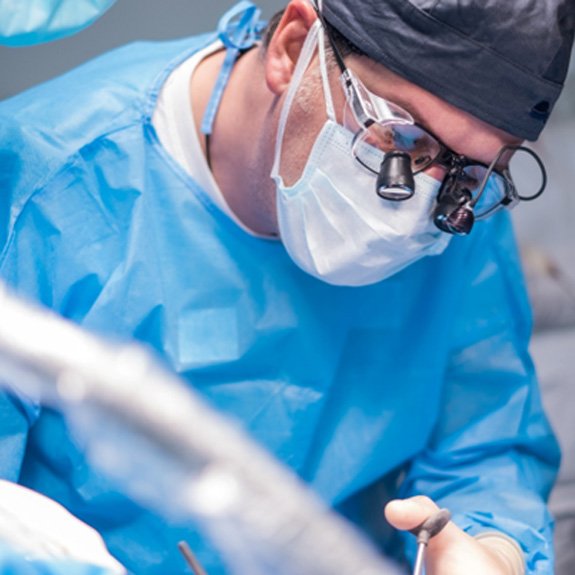Tooth Extractions – Weatherford, TX
Say Goodbye to Your Troublesome Tooth
While we do everything that we can to keep your smile radiant and your oral health in top condition, sometimes teeth need to be extracted to protect you from future issues. In the event a tooth does need to be extracted, (and that is far from our first option when providing treatment) you can rest assured knowing that you’ll be served by a team you can trust. While we offer sedation services, we’re sure that having your care performed by people you’ve gotten to know will make the experience all the more comfortable. If you think it may be time to say goodbye to your troublesome tooth, call Beacon Dentistry of Weatherford today to schedule an appointment.
Why Choose Beacon Dentistry of Weatherford for Tooth Extractions?
- In-House Implant Placement Available
- Treatment Performed by Expert – Dr. Johannsen
- Cone Beam Scanner Technology In-House
Reasons Why Tooth Extractions Are Necessary

We avoid extracting teeth unless it’s absolutely needed. However, they may be performed in the following instances:
- A tooth is severely damaged beyond repair
- Gum disease has damaged supporting bone tissue
- Your mouth needs room for orthodontic treatment
- A baby tooth won’t fall out
- Room is needed to place a denture
- To replace a weak tooth with a dental implant
Our goal is to make you feel comfortable and prepared. No matter what the reason for your extraction may be, we’ll do everything possible to create a relaxing environment.
The Process of Removing a Tooth

Teeth are either removed by pulling or surgical extraction. Teeth can only be “pulled” when they have fully emerged from the gumline. In this case, we will start by numbing the area around your teeth with a local anesthetic and using a clasping tool to shift around the tooth until it breaks away from the gums. If pulling the tooth isn’t possible, the tooth will need to be surgically extracted. For this procedure, a small incision is made to the gum tissue to allow us the ability to reach enough of your tooth to fully remove it.
When we examine your smile, we will determine which extraction method is ideal to meet your needs. When we discuss your extraction, we can also talk about potential tooth replacement options to prevent future oral health issues as a result of missing teeth.
Tooth Extraction Aftercare

Before you leave our office, we will provide you with specific aftercare instructions to help you stay comfortable and avoid complications. Every case is different, but here are some steps that we typically recommend for a quick, comfortable recovery:
- Rinse with saltwater 24 hours after your procedure.
- Avoid using tobacco products until your mouth has healed.
- Keep your head elevated while you sleep.
- Get plenty of rest to promote healing.
- Take recommended over-the-counter and prescribed medication as directed.
- Apply a cold compress to reduce swelling and discomfort.
- Stay away from hard, crunchy, and sticky foods.
Tooth Extraction FAQs
While having a tooth extraction may not be the ideal solution, it's reassuring to know that our team at Beacon Dentistry of Weatherford is fully prepared to address any concerns you may have and ensure you feel at ease before your procedure. Below, you can explore our answers to some of the most frequently asked questions we get from patients. Should you have any additional questions not covered here, please don't hesitate to let us know, and we'll make every effort to assist you in feeling more comfortable.
Does Getting a Tooth Extracted Hurt?
A tooth extraction typically involves a numbing process, which helps minimize pain during the procedure. While some soreness and discomfort can be expected afterward, diligently following your aftercare instructions is crucial. This not only helps prevent infection, but also reduces swelling and promotes healing. If you experience worsening pain or show signs of infection (i.e., fever), you must contact our team promptly for assistance.
Can I Leave the Space Empty After a Tooth Extraction?
While it might be tempting to leave an empty space after a tooth extraction, it's important to consider the broader impact on your oral health and daily life. Even if the extracted tooth is not visible, it plays a crucial role in chewing properly and clear enunciation. A single missing back tooth can make chewing difficult, potentially leading to nutritional problems and indigestion. Additionally, missing a front tooth can affect your speech, causing a lisp due to altered tongue movements.
To prevent these issues, it’s highly recommended you schedule an appointment with your dentist after the healing process. We can help you explore suitable tooth replacement options that not only restore your smile, but also ensure your overall well-being.
What Can I Do to Speed Up the Healing Time?
For a faster tooth extraction recovery, remember these tips:
- Prioritize rest, avoid strenuous activity, and elevate your head to reduce swelling
- Follow the dentist's gauze instructions to promote blood clot formation, and avoid touching the wound
- Stay away from mouthwash and acidic foods to aid healing
- Hydrate, skip straws, and minimize excessive spitting to reduce dry socket risk
- Reduce puffiness with a cold compress on your cheek
- Take prescribed pain medication, avoiding blood-thinning drugs like aspirin
These steps can speed up your healing and ensure a smoother recovery.
How Should I Prepare for My Tooth Extraction?
Preparing for your tooth extraction is essential for a smooth experience. Here's what to do:
- Talk to Your Dentist – Discuss any concerns or questions with your dentist, covering what to bring, dietary restrictions, and specific instructions.
- Follow Guidance – Adhere to your dentist's pre-extraction instructions, whether it's fasting or picking up prescribed medication, to ensure a successful procedure.
- Plan Transportation – Arrange for a trustworthy adult to drive you home, especially if you'll receive anesthesia, ensuring your safety and peace of mind.
With these steps and open communication, you'll be well-prepared for your tooth extraction, ensuring a comfortable and worry-free experience.
I Need a Checkup & Cleaning I am Looking for a Dentist for My Child I am Concerned about Bleeding Gums I Have a Cavity or Broken Tooth I am Missing One or More Teeth I am Unhappy with My Smile I Want a Straighter Smile I am Scared of the Dentist I am in Pain & Need Help View Our Services

